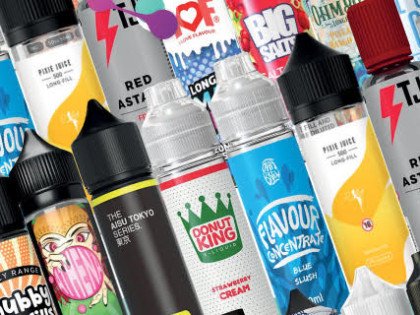One of the latest tactics from those opposed to using vaping, as part of a harm reduction strategy, has been to claim that the nicotine in liquids can have an impact on the brains of young people. Plus, there are those who will go to great lengths to point out how the liquids can poison users through contact with the skin or ingestion. The argument goes, evil companies are targeting teens to get them addicted to nicotine liquids as a process to wean them onto traditional tobacco products.
The study, carried out by a team led by Richard Miech, clearly carries bad news for the naysayers. Having looked at the responses from over 3,800 students from a sample of 14,983, researchers conclude that a huge majority of kids are only using zero milligram juices. Only a small fraction of teen vapers were bothering to use nicotine-containing liquid, the bulk of respondents claiming that they were only interested in the flavour.
With the Centres for Disease Control worrying about increasing incidents of youth vaping, Miech points out that they’re framing their approach to the debate in the wrong way. By referring to vape products as electronic nicotine delivery systems (ENDS) they create an automatic assumption that this is what they’re being used for.
1,701 respondents reported vaping over the previous four weeks. Of those, 1,085 said they’d used an electronic cigarette up to five times and 616 said they’d used one more regularly. But of those vaping, two-thirds were using equipment “just for the flavouring”.
It’s this remarkable result that forced the academics to question the use of ENDS as a term of description: “The term stands for 'electronic nicotine delivery system,' which seems inaccurate for the description of a device that the majority of youth do not use to vape nicotine.”
Miech added a small note of caution: “Even if kids are not vaping nicotine, vaping could still predict smoking initiation to the extent that vaping teaches kids to smoke and gets them used to the behaviour. Regardless of the substance vaped, vaping removes the substantial psychological barriers involved in the inhalation of smoke into the lungs. And vaping any substance could desensitize youth to the dangers of smoking; that is, after vaping flavouring and not seeing any immediate health detriment, some vapers may conclude the dangers of smoking/vaping are exaggerated.”
"While vaping may serve as a smoking cessation tool for adults, it seems to be used very differently among adolescents. Taking into account these different use patterns will likely help future intervention to curb nicotine addiction and be more effective."
"In conclusion, the majority of US youth who use vaporizers and e-cigarettes do not vape nicotine," the team say. "This finding challenges many common assumptions and practices, and points to the need for vaporiser-specific research to assess and ultimately regulate the public health threat of vaporisers."
Photo Credit:
Images
Banner teen https://upload.wikimedia.org/wikipedia/commons/e/ee/Smoke_Screen_(16582794210).jpg
Tables from http://tobaccocontrol.bmj.com/content/early/2016/07/21/tobaccocontrol-2016-053014
Dave Cross
Journalist at POTVDave is a freelance writer; with articles on music, motorbikes, football, pop-science, vaping and tobacco harm reduction in Sounds, Melody Maker, UBG, AWoL, Bike, When Saturday Comes, Vape News Magazine, and syndicated across the Johnston Press group. He was published in an anthology of “Greatest Football Writing”, but still believes this was a mistake. Dave contributes sketches to comedy shows and used to co-host a radio sketch show. He’s worked with numerous start-ups to develop content for their websites.
Join the discussion
Harm Reduction For The Rich
The United Kingdom risks becoming a harm reduction country only for the wealthy, according to Michael Landl of the World Vapers’ Alliance
Longfills as an Alternative to Disposables
The disposable vape ban will impact many people, but there’s no reason to be concerned… Grab yourself a pod kit and a Longfill and you’ll be back to vaping the way you want to, just in a cheaper, more environmentally friendly and legal way.
COP10 is a Threat to Safer Nicotine Products
The EU obscures its position on low-risk alternatives to smoking before the WHO COP10 conference in Panama, starting Monday
Nicotine Is Not A Culprit
Planet of the Vapes has always encouraged smokers to use the quit product that works best for them, and snus is a product that seems to be unfairly blocked because it contains nicotine






-listing400.jpg)




